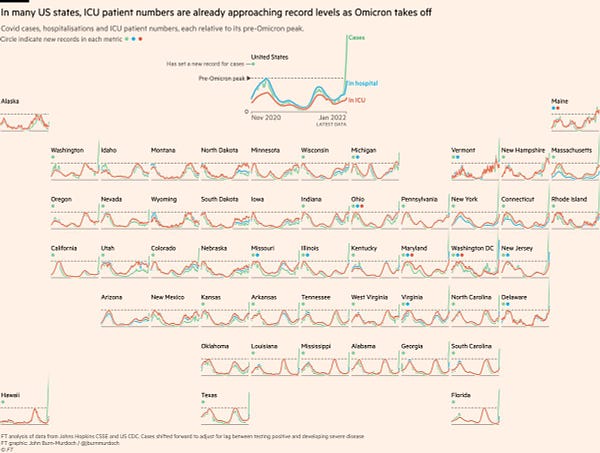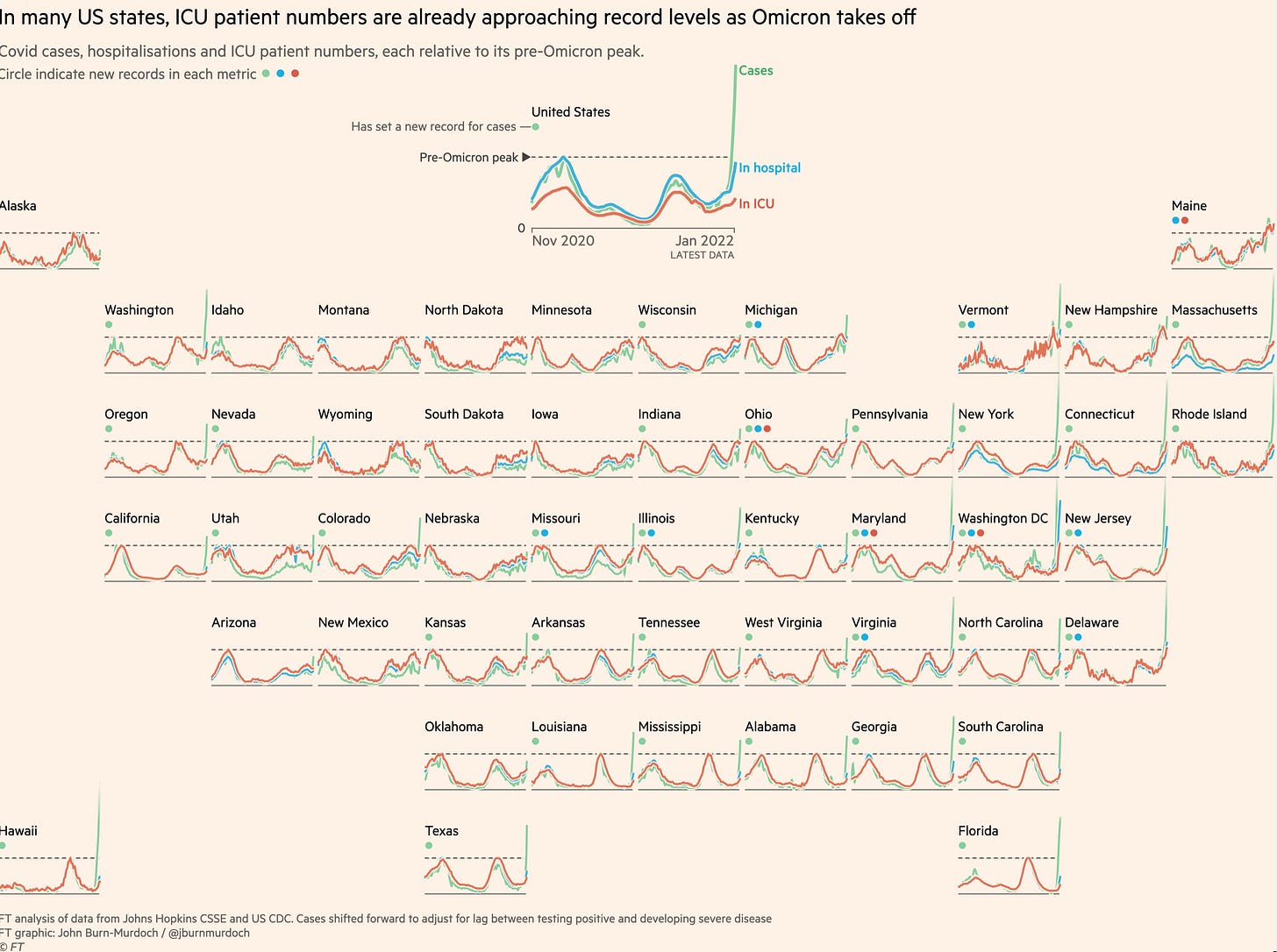What Is þe Proper Mood to Have When Thinking About þe Minimum Wage?
& BRIEFLY NOTED: For 2022-01-07 Fr
CONDITION: I AM F———ED: “You screwed up: you trusted us…”: There I was, defending Fed Vice Chair Richard Clarida’s stock transactions as almost certainly innocent rebalancing—and saying that, while Fed officials should not have control over their money, this was not exploitation of inside information. And it turns out I was a fool to believe the Fed, and the Fed was foolish to believe Clarida’s claims it was a previously-planned rebalancing:
Jeanna Smialek: A Fed Official’s 2020 Trade Drew Outcry. It Went Further Than First Disclosed: ‘Richard H. Clarida, the departing vice chair of the Federal Reserve… came under fire for buying shares on Feb. 27 in an investment fund that holds stocks—one day before the Fed chair, Jerome H. Powell, announced that the central bank stood ready to help the economy as the pandemic set in…. Mr. Clarida’s recently amended financial disclosure showed that the vice chair sold that same stock fund on Feb. 24…. The Fed initially described the Feb. 27 transaction as a previously planned… “rebalancing”…
LINK: <https://www.nytimes.com/2022/01/06/business/economy/richard-clarida-fed-stock-fund.html>
First:
The first two of these strike me as on target. The third… not so much:
Bryan Caplan: The Missing Moods: ‘You can learn a lot by comparing the mood reasonable proponents would hold to the mood actual proponents do hold….
The hawk…. The reasonable hawkish mood is sorrow–and constant yearning for a peaceful path…. [But] the standard hawk moods are anger and machismo….
The immigration restrictionist…. The reasonable restrictionist mood is anguish that a tremendous opportunity to enrich mankind and end poverty must go to waste–and pity for the billions punished for the “crime” of choosing the wrong parents….
The proponent of labor market regulation. Labor regulation…. The reasonable pro-regulation mood is humility about the size of the gains plus wonder that even modest gains are on the table…. "Strangely, that disemployment effect turns out to be small–even in the long-run. As a result, labor market regulation usually makes workers better off even taking the downside into account. The evidence is so strong that it overcame our initial presumption that the downside was serious, especially in the long-run.”
This mood is essentially non-existent among non-economists, and rare among pro-regulation economists…. They don’t sound surprised that the law of demand coincidentally breaks down just when they hoped it would, or stressed that they might have failed to account for long-term damage. This doesn’t prove they’re wrong, but even the intellectually strongest proponents of labor market regulation are hard to take at face value…
LINK: <https://www.econlib.org/archives/2016/01/the_invisible_t.html>
I read this, and I think:
First, you really do not need a negative or a small disemployment effect to justify a minimum wage. All you need is for those who draw their incomes from capital to be significantly richer than those who draw their incomes from labor, that the disemployment effect not be overwhelmingly large, and assent to the proposition that there is declining marginal utility of wealth. Then, from any utilitarian point of view, a minimum wage that redistributes income from capital to labor helps to repair the greatest of all market failures: the divergence between the wealth-weighted “social welfare function” maximized by the competitive market and the equal-weighted social welfare function that those of us who are not shills for the rich and powerful take as our baseline.
Thus the mood affiliation should go the other way: It is Bryan Caplan who ought to be bitterly, bitterly disappointed to find that large differences in incomes are essential to the productive functioning of the economy and deeply, deeply regret that they are needed for the progress of the human race. He should lament that people like me require high compensation in order to put out our best and most productive efforts—for, after all, the advance in total human happiness from me drinking another bottle of Baronne Philippine Mathilde Camille de Rothschild’s 1993 cabernet-based blend is vastly smaller than if the same resources were spent enabling 20 immigrant single mothers to each spend a $25 gift card at McDonalds, no?
Yet I see not such. the closest I can find is the faux regret of Andrew Carnegie, back in 1889 in his The Gospel of Wealth:
The price which society pays for the law of competition, like the price it pays for cheap comforts and luxuries, is also great; but the advantage of this law are also greater still, for it is to this law that we owe our wonderful material development, which brings improved conditions in its train. But, whether the law be benign or not, we must say of it, as we say of the change in the conditions of men to which we have referred: It is here; we cannot evade it; no substitutes for it have been found; and while the law may be sometimes hard for the individual, it is best for the race, because it insures the survival of the fittest in every department. We accept and welcome therefore, as conditions to which we must accommodate ourselves, great inequality of environment, the concentration of business, industrial and commercial, in the hands of a few, and the law of competition between these, as being not only beneficial, but essential for the future progress of the race. Having accepted these, it follows that there must be great scope for the exercise of special ability in the merchant and in the manufacturer who has to conduct affairs upon a great scale. That this talent for organization and management is rare among men is proved by the fact that it invariably secures for its possessor enormous rewards, no matter where or under what laws or conditions. The experienced in affairs always rate the MAN whose services can be obtained as a partner as not only the first consideration, but such as to render the question of his capital scarcely worth considering, for such men soon create capital; while, without the special talent required, capital soon takes wings. Such men become interested in firms or corporations using millions; and estimating only simple interest to be made upon the capital invested, it is inevitable that their income must exceed their expenditures, and that they must accumulate wealth. Nor is there any middle ground which such men can occupy, because the great manufacturing or commercial concern which does not earn at least interest upon its capital soon becomes bankrupt. It must either go forward or fall behind: to stand still is impossible. It is a condition essential for its successful operation that it should be thus far profitable, and even that, in addition to interest on capital, it should make profit. It is a law, as certain as any of the others named, that men possessed of this peculiar talent for affair, under the free play of economic forces, must, of necessity, soon be in receipt of more revenue than can be judiciously expended upon themselves; and this law is as beneficial for the race as the others.
Second, nearly all economists I talk to are worried that the minimum-wage literature has missed something. It is still the case that Robert M. Solow believes not that Card and Krueger have shown that minimum wages (in the relevant range) boost employment, but only that the disemployment effect is small enough to be drowned out by statistical noise—and that does indeed overcome his initial presumption. It is still the case that most conversations about the minimum wage that I have with other economists end with us confused, and musing about just how it can be that small firms demanding labor find themselves facing an upward-sloping supply curve. Why isn’t there an enormous internet site with the current market-clearing price for thousands of types of labor continually updated, just as there are so manu with the current market-clearing price for equities?
I agree that non-economists do not share this worry of ours. But why should they? They have not had Friedrich von Hayek’s important and valid insights engraved on their neurons, and hence do not find themselves outside of their comfort zone when they run across a place where they do not apply. “Competition is optimal unless there is a market failure; where is the market failure?” is not their first intellectual move in every situation.
One Video:
Economics Explained: How Has Brexit Been Going?: <https://www.youtube.com/watch?v=P0G3lYTOI0Q>
One Picture:
John Burn-Murdoch: ’NEW chart for US Covid-watchers: Key question with Omicron wave is whether severe disease—hospitalisations & ICU—decouples from cases. In the UK it has, but there are signs the US decoupling is weaker, perhaps due in part to lower vax rates. Track it here for every state: <https://t.co/JOyM6AXo2G>


Very Briefly Noted:
Emma Agyemang: Legislators Face Battle to Implement Historic Global Tax Deal: ’Countries agree reform of corporate revenues but will struggle to make it legally binding… <https://www.ft.com/content/585a7b3d-3ce7-4959-b72a-ed6f66f451b5>
Doug Saunders: The Era of Globalization Has Come to an End. We Don’t Yet Know What Replaces It<https://www.theglobeandmail.com/opinion/article-the-era-of-globalization-has-come-to-an-end-we-dont-yet-know-what/>Doug (Mule): In the Middle of Transition: 2022 Semiconductor Outlook: ‘If there were ever a scenario of an historically cyclical and supply-driven market shifting into a seularly growing, demand-driven market, we’re living in it…
Aaron Rupar: January 6 Was About Ending Democracy. Republicans Told Us as Much: ‘GOP gaslighting can’t change what we all saw…
Paragraphs:
Martin Sandbu: While We Wait for Levelling Up: ‘More than two years after the UK government was elected on the flagship promise (next to Brexit) of “levelling up” the country’s unconscionable regional inequality, there is not much flagship policymaking to show for it…. Regional inequality is one of Free Lunch’s favourite interests…. What it is that should be levelled up… is productivity…. It… depends here and now on productive businesses choosing to expand, and on businesses generally to shift into higher-productivity production practices. That is most likely in a “high-pressure economy”…. An immediate support system for job seekers and job switchers with little or no savings to carry them through the time it takes to retrain or search for better jobs…. Allow full expensing of investment costs for businesses…. Boost spending in left-behind places… money in the hands of households, to sustain the kind of local economic activities that double as community spaces…. How can we ensure that capital does not flee left-behind areas but flows to them?…
LINK: <https://www.ft.com/content/7c23d4b3-d7dc-4543-9ef1-c59aa6b11e0d>
Tim Harford: How to Stand Up to Your Bullying Inbox: ‘I delete most emails immediately after scanning them…. If a polite “Thanks!” is required, I tend to schedule it to be delivered the next day. Instant replies risk provoking a back-and-forth conversation. Nobody wants that. The trick here is to make sure that getting emails out of the inbox is an effortless process… LINK:
<https://www.ft.com/content/f4c9f878-0b66-4d7c-a452-7967f29c6854>
Simon van Zuylen-Wood: The radicalization of “Hillbilly Elegy” author J.D. Vance: ‘National conservatism sells itself as a philosophy that could save these places, with its child subsidies and steel tariffs…. In the Senate, Josh Hawley crusades against “the tyranny of big tech,” while Marco Rubio pushes for an industrial policy to revive domestic manufacturing. Meanwhile, NatCon junior member Mitt Romney used the emergency of the pandemic to break with party orthodoxy on spending, authoring widely praised legislation offering parents up to $15,000 a year to defray child-rearing costs…. But they haven’t meaningfully tilted the GOP’s direction. “I mean, Donald Trump was elected, and the only thing the Republican Party accomplished in two years with control of Congress was a big tax cut,” says Oren Cass, who runs a new national-conservative think tank, American Compass. Worth noting: Rubio, Hawley and Romney all supported Trump’s corporate tax cut. “I think anti-wokeness is probably enough to win elections,” Vance told me. “But I don’t think it can actually bring the country together to solve some of our big problems."… In late November, the Ohio Republican Party held a very awkward candidate forum…. Eventually, however, Vance landed on something that got the audience going: He called for Republicans to shut down the government until President Biden ended his vaccine mandate for federal workers. A vaccine mandate is exactly the sort of idea that a “common good” national conservative like Vance should support. Yet a few days after the forum, I got a text message from his campaign, raising money off the line…
LINK: <https://www.washingtonpost.com/magazine/2022/01/04/jd-vance-hillbilly-elegy-radicalization/>
Timothy Burke: Fakepolitik: ‘Take Robin Wright’s New Yorker article on the “looming crisis” of Iran’s nuclear threat as an example. It’s entirely written from the perspective of US military and executive officials and academics who closely hew to their world. The Iranian Ambassador… enters into the article at the very end, but there’s no other Iranian perspectives quoted or explored…. That’s pretty weird…. I have no fondness for nor illusions about the present rulers of Iran: they’re authoritarians who sponsor a good deal of violence and disorder throughout the Middle East and who oppress their own citizens. It would be a good thing if Iran became a more democratic state that was more focused on good governance within its own borders…. Perhaps even less promising is something that Wright’s article only touches on a few times when it really ought to be the lead, which is that Iranian negotiators are utterly rational in thinking that there is absolutely no point to bargaining with the United States given that they did so before, arrived at an agreement… kept to the terms of the agreement… watched it torn up by Donald Trump… faced an American government that openly talked about a major military attack on Iran… killed a high-ranking government official in a very public way…. Which again, makes Iran’s foreign policy and its acquisitions of missiles perfectly rational…. Even Superman knows that if he just has to negotiate with Lex Luthor, he’s got to give Luthor something that Luthor wants—and that he’s got to stick to the terms of the bargain if he ever expects to negotiate with any enemy in the future…
LINK:
Aaron Rupar: What We Learned from the Hannity Texts Released by the Jan. 6 Committee: ’Fox News host Sean Hannit… an unofficial adviser to the Trump White House…. Trump was at least daydreaming of coup-like schemes to keep power even after January 6…. Ffrom December 31 suggests that Hannity had foreknowledge of what was planned for January 6, thought it was likely to do Trump more harm than good, and was advising Trump to essentially take the L, cede power, and head to Florida…. “Im very worried about the next 48 hours,” Hannity texted Meadows on January 5, a comment diametrically opposed to what he said on TV and on radio later that day…. As Mikey Kay put it on Twitter, “the interesting bit here is Hannity’s voice of reason off camera, and the pushing of conspiracy theories and unabated support for Trump on camera. The views we see on Hannity’s show are clearly not his personal views”…
LINK:
PAID SUBSCRIBER ONLY Content Below:
Keep reading with a 7-day free trial
Subscribe to Brad DeLong's Grasping Reality to keep reading this post and get 7 days of free access to the full post archives.









